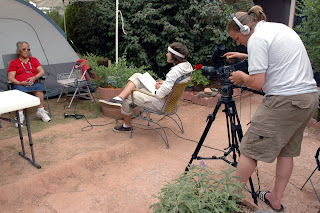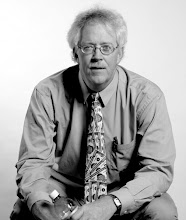One group went to Cove, Arizona, to complete a final interview with Harry Walters, and then help build a patio-brick sidewalk for Anna Walters.
Another group interviewed a co-worker of Ruth Roessel's at the Rough Rock Community School, and then had an opportunity for a short follow-up interview with Ruth, herself.
(Above two photos by Cindy Killion)
(Above two photos by Pete Swanson)
The group focusing on Dr. Wilson Aronilth, a faculty member at Diné College, interviewed him in his classroom. He explained how he uses pictures and wall murals of the Navajo Creation Story in his class "Foundations of Navajo Culture."
(Above three photos by Kim Streblow)
A fourth group completed a final interview with Navajo Codetalker Sam Tso, and collected a few more images and video around his place.
So why was it a down day?
Well, partly because everyone is tired and a bit achy from the four-hour horse ride yesterday. Many of us -- me included -- are a bit homesick. We're having a great time here, learning a lot and bonding as a group. But, it's been nearly three weeks since we've seen and hugged and smiled at the most important people in our lives. So, we're fraying a bit around the edges.
I'll admit that I inadvertently added to the stress. Here's how:
I created a summary document that outlined my vision for the three distinct products each group will create, and set deadlines. I thought the document would clarify expectations and give students the opportunity to create a timeline and specific assignments for each group member. Unfortunately, my document created more stress and confusion. As a faculty member in a mass communication program, I failed to effectively communicate with my students.
After dinner, we had a group meeting during which Cindy Killion and I further clarified my thoughts, and tried our best to calm the students and help them plan how to finish their projects. Thankfully, this session eased everyone's minds and it seems they understand better where to go with their projects from here.
I explained to the students that they were involved in a very unique travel study program. They knew coming into it this program would be fun and would include lots of site-seeing and cultural learning. They also knew this program -- unlike most travel study trips -- had a very real and important product to be created. When it's done, they can be proud of their work and can use the projects to show off their talents, skills and abilities.
I also explained it is normal for them to feel stress and discomfort at this point. In fact, I am not doing my job well if they don't feel stretched a bit. Learning occurs at the edge of the comfort zone -- not in the middle of it. If everything were easy and quick to complete, they would not be learning and growing.
Tomorrow will be a good day. We'll meet in class in the morning and hear a progress update from each group and everyone in class will be invited to offer helpful suggestions. Then we have one more service project to complete for an elder, a little tourist-style souvenir shopping, then pack and prepare to leave early Friday morning. In the evening, we'll have a Listening Circle ending our time together the way we began, with each student talking a little about thier experience, what they've learned, what they'll remember most, etc.
Parents and friends, don't worry. In less than 48 hours we'll be returning your students to you: smarter, more mature, and experienced. Even if they don't totally realize it, they will be different than when they left. Their lives have been changed by this adventure. They now have understanding and compassion for Navajo people in particular, but also for American Indians in general. They feel responsible to tell their stories accurately, faithfully and compellingly. Most have talked about finding other ways to help people here who live in poverty and without many things we take for granted like indoor plumbing, running water, TVs, computers, reliable phones, etc. Many have talked about visiting again and helping more.
Our three weeks together has been fun, exciting, interesting, funny, and enjoyable. To be fair, we've also felt exhausted, frustrated, sad, and lonely at times. My hope is that when all the projects are complete, the students will look back on this period of their lives as a great experience and that the good times and pride in quality work well-done will far outweigh the stress and difficulty encountered.












No comments:
Post a Comment